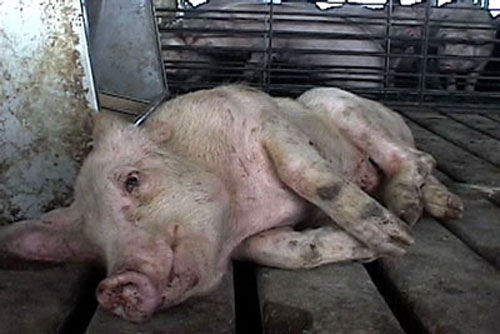Dutch scientists have found much lower levels of antibiotic use and prevalence of MRSA on organic pig farms compared with non-organic pig farms [1].

Their research indicates that 3% of organic pigs in the Netherlands are carrying livestock-associated MRSA, compared with 38% of non-organic pigs. This type of MRSA was first found in 2003 and is of particular concern because it can spread to humans causing serious infections.
Emma Slawinski from Compassion in World Farming speaks on behalf of the Alliance to Save Our Antibiotics, saying: “The Dutch research shows that by raising pigs in higher-welfare conditions with bedding such as straw and outdoor access the levels of antibiotic use and of MRSA can be greatly reduced. This benefits human health too, as livestock-associated MRSA has already caused human deaths in Europe.
“British pig farmers need to remain vigilant to ensure that MRSA does not become established in the British pig herd.”
The Alliance to Save Our Antibiotics urges the pig industry and the Government to do more to ensure that MRSA never becomes a problem in British pigs. It would like the following to take place:
The Government to undertake routine surveillance for livestock-associated MRSA in British pigs to ensure that any development can be identified and addressed at an early stage.
- No live pigs to be imported into the UK unless they have been individually tested for MRSA.
- Vets and farm workers from outside the UK, and British farmers and farm workers having contact with farm animals outside the UK, to be screened for livestock-associated MRSA before having contact with British farm animals.
- Greater efforts by the pig industry to reduce its dependence on antibiotics.
- More pigs to be reared in well-designed free-range systems and fewer to be kept indoors on concrete without straw.
The researchers collected nasal samples from 60 pigs and five dust samples from the buildings on each of 24 organic pig farms. Pig farmers, their workers and families were also tested for MRSA. The results were then compared with earlier research which had used the same methods to examine non-organic pig farms.
On non-organic farms, 71% of farms sampled were positive for livestock-associated MRSA in comparison to 17% of organic farms. Of the 24 organic farms tested, farm workers on four of the farms tested positive for livestock associated MRSA (17%) but in one case this was a hospital strain and not a livestock-associated strain. This rate was significantly lower than the conventional farms tested.
The researchers also found that the number of daily dose of antibiotics used on the organic pig farms was at least 70% lower than on the non-organic farms. Research by UK scientists has shown that the use of antibiotics on British organic pig farms is very much lower even than on Dutch organic farms.
Government scientists have never tested British pigs for MRSA. Testing of five dust samples from each of 258 British pig farms found no evidence of MRSA, but this appears to be a relatively unreliable method. [3] Only one of 120 dust samples (0.8%) tested by the Dutch scientists contained MRSA compared to 3.3% of the samples from the pigs themselves.
For further information, images or to arrange interviews contact:
Lara Richardson at Compassion in World Farming 01483 521952 or 0781 4038 196 or email [email protected]
[1] van de Vijver et al., 2012. Antibioticaresistentie in de biologishce varkenshouderij (Antibiotic resistance in organic pig farming – Does MRSA also occur in organic pigs and their keepers?).www.louisbolk.org/downloads/2614.pdf
[2] Defra-research carried out by the Veterinary Laboratories Agency and published in 2006 found large differences in antibiotic use between British organic and non-organic pig farms. Five organic farms were compared with six non-organic farms and, per kilo of meat produced, the non-organic farms used between 13 and 330 times more antibiotics than the highest-consuming organic farm. Two of the organic pig farms used no antibiotics at all during the two-year study. The Defra research also found much lower levels of antibiotic resistance in E. coli on the organic farms compared with the non-organic farms. Research funded by the Scottish Executive similarly found that organic pigs had much lower levels of resistance in E. coli compared with non-organic pigs.
[3] EFSA, 2008 www.efsa.europa.eu/en/efsajournal/doc/1376.pdf



















Look at the miserable pig who is absolutely tortured in these farms. We need to go back to smaller scale more humane family farming and these monstrosities should be abolished. In the end it’s bad for our own health as well. More people should be encouraged to eat more veges and less meat in general. Cheap and abundant meat food that is enabled by factory farming is also making people sicker and fatter.